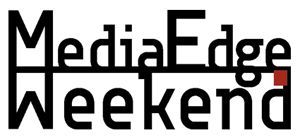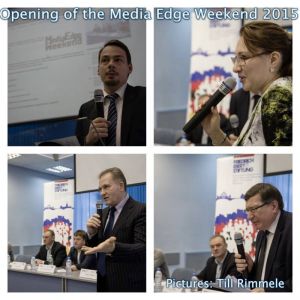MediaEdge Weekend, post-event summary
December 01, 2015

During two days on Thursday, November 26 and Friday, November 27, the School of Journalism and Mass Communications hosted this event dedicated to the latest trends in journalism with participation of professionals and scientists from the United States, Germany and Russia.
MediaEdge Weekend started with an opening speech from the Director of the Faculty of Journalism and Mass Communication, Anatoly Puyu, and followed with a panel discussion "The rights and opportunities of the journalist within mediacrisis". It is noteworthy that the discussion involved not only academics and scientists but experts from different journalism and communication organizations.
The main topic of this panel was related to continuing since 2001 media crisis which eventually lead to restructuring of mass media sector. One of the speakers, Dmitriy Sokolov-Mitrich, writer, journalist and media developer, directly outlined a crucial challenge for modern or future journalists, which is financial instability: ‘Journalist face economic problems these days most. They are paid like waiters and freelancers are even in a much worse situation. So many of them go to PR to compensate’ – agreed with him another speaker, Cornelia Hass, Director of the DJU (German Union of Journalists).
The abovementioned phrase outlined another challenge which arises consequently from the financial one: in order to inrease financial income journalists have to find new ways of improving their content . Today they are facing a difficult choice, either to acquire new skills and work in financially successful media projects, or to continue classical writing and news reporting and be left out in the cold by the ruthless and unstoppable progress of new technologies.
The representatives of the education sphere also shared their opinion on such matters and one of them Dr. Svetlana Bodrunova, Head of the Department of Media-Design and Information Technologies, bottom lined the panel discussion with particular advice how can a journalist act in terms of crisis situation: ‘Journalists should multitask if they want to survive…As a reporter specializing on Germany you can for example make translations or organize events’.
After small coffee-break the conference continued with open lectures, workshops and presentation from every invited speaker.
Justin Varilek presented his project Hackpack.press, which is ‘the global network for the media industry that strengthens independent journalism and helps media outlets better inform the public about the news that matters’ according to the information on the official web-page. Generally it’s a platform for freelance journalist, reporters and correspondents.
Then Guido Kowalski from Grimme-Institut, Germany, showed to the students and guests of the conference his presentation titled “Generation Transmedia” consisted of different videos, web-sites and tools for media. His agenda was to show the audience different ways of creating a new content, to explain how social media can affect storytelling and how to improve the latter with these modern social platforms.
Artem Galustyan, a journalist from the Kommersant newspaper, during his workshop shared some personal experience but the main emphasis was made on development of the long-reads using multimedia methods. Max Avdeev, a photographer with Buzzfeed, also talked about difficulties and issues that occur in everyday life of photojournalist.
Dmitriy Sokolov-Mitrich spoke about the fate of nations in the absence of their own stories. ‘The story is the most important DNA of the human being’ – that was basically the main thesis of his presentation. Also he shared his own thoughts on current political and economic situations and what young authors, journalists and entrepreneurs could possibly gain out of them.
The conference concluded with the roundtable discussion “Modern journalist: sources of income and professional growth strategies”. The experts from their own perspective gave few advices on how to exploit new technologies, to form original ideas in order to increase your personal income and what different niche markets students and young professionals can tap into.
The main points, which bottom lined the roundtable as well as the whole conference, were the following:
Improve the quality of your product. If the story is bad, don’t do it, try to find another one;
Use different media channels to gain more subscribers. ‘Youtubers’ are the new journalists, like it or not, they are making money;
In today’s job market, you need to stay flexible; no one stays at the same job their whole life;
Multimedia is important;
Educate yourself, experiment, do interesting projects for free while you can so you can get more experience.
In conclusion all the experts were united in one last but not less important advice: ‘While studying in the university make friends. Then you will have a team and you can do anything you want with it’.
We thank all the participants and guests of the conference and our special gratitude goes to the speakers, namely: Marseille Rёtig, Head of Saint Petersburg office of Friedrich-Ebert Fund; Andrey Radin, Director General of the LOT television channel, Head of the Department for Culture of the General Consulate of the Federal Republic of Germany; Cornelia Hass, DJU (German Union of Journalists); Andrey Radin, LOT television channel; Justin Varilek, HackPress.press project; Dmitriy Sokolov-Mitrich, writer, journalist, media developer; Svetlana Bodrunova, Saint Petersburg State University; Egor Korolev, Saint Petersburg State University; Guido Kowalski’s open lecture, Grimme-Institut; Jacub Gornicki; Artem Galustyan, Kommersant; Kirill Artemenko, Maria Rzaeva, Bumaga; Diana Kachalova, Novaya Gazeta; Natalia Karabasova, Hubert Burda Media; Marina Koroneva, AFP; Professor Anatoly Puyu, Director of the School of Journalism and Mass Communications.
So far no comments




